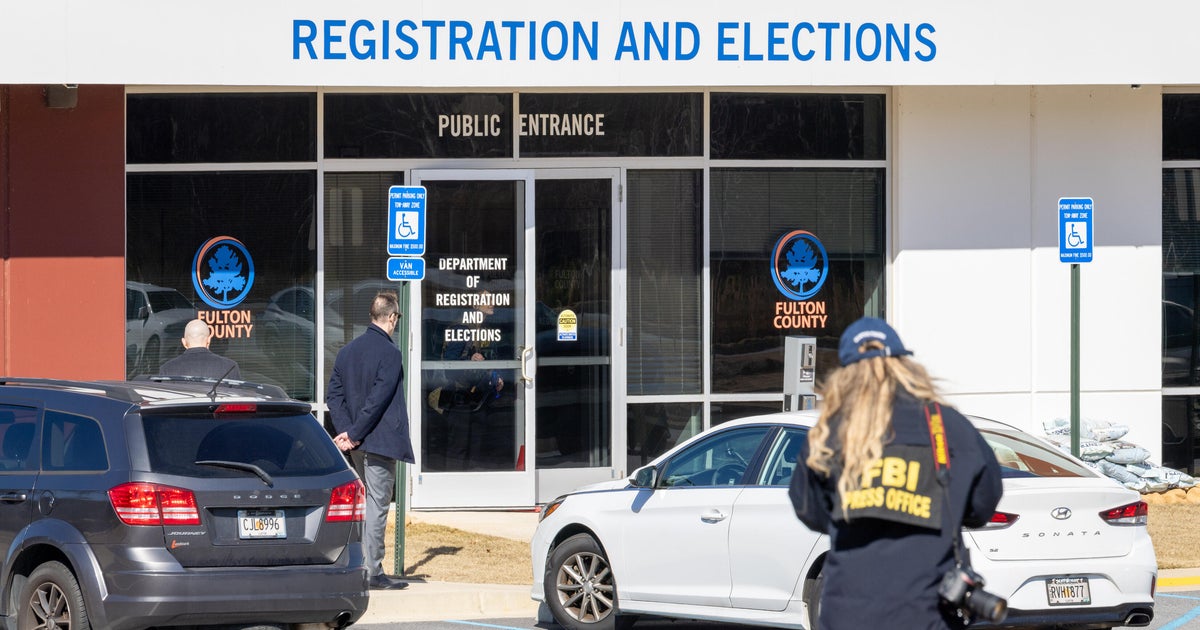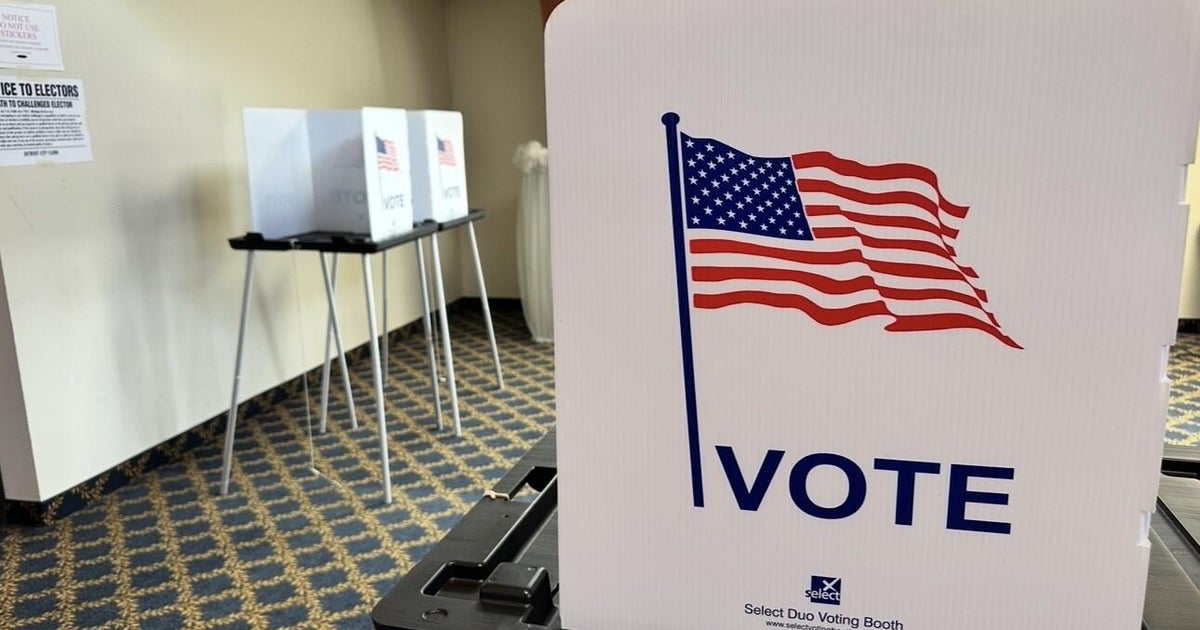Trump and Barr say mail-in voting will lead to fraud. Experts say that's not true
As election officials from both parties are scaling up their vote by mail operations ahead of November's election, the president and the attorney general are making unverified claims that foreign actors could tamper with those ballots.
In an interview with Fox News on Sunday, Attorney General Bill Barr said mail-in voting "absolutely opens the floodgates to fraud" and claimed that "a foreign country could print up tens of thousands of counterfeit ballots, and (it would) be very hard for us to detect which was the right and which was the wrong ballot."
It was the second time this month Barr had speculated about election fraud in November. In an interview with the New York Times, the attorney general said a number of foreign countries "could easily make counterfeit ballots, put names on them, send them in." In a string of tweets on Monday, President Trump followed suit, claiming the 2020 election would be "rigged" because "millions of mail-in ballots will be printed by foreign countries."
The comments have baffled election officials and experts who say a complicated and detailed set of safeguards in place are expressly designed to detect and prevent such interference.
"You would have to reproduce the entire election administration apparatus somewhere in the middle of Siberia," says Charles Stewart, the founding director of the Election Lab at Massachusetts Institute of Technology.
Tina Barton, a Republican who serves as the clerk in Rochester Hills, Michigan, said her city's ballots are printed by one company, have a unique ballot number for each voter, include a barcode that can bring up a voter's record and are programmed to be compatible with the city's counting machines. Beyond those steps, the envelopes for mailing the ballot, the secrecy sleeve and ballot instructions are all standardized, making it even more difficult to mimic the mailing.
"There's a whole packet of information and duplication of that would be an extreme effort," Barton said. "But again, even if they went to that extreme effort, they're not going to have a ballot that's going to be read by the programming in my machine."
In Michigan, a key battleground state that Mr. Trump won in 2016, this will be the first presidential election cycle with no-excuse absentee voting, which two-thirds of voters approved in a 2018 ballot measure. Officials are gearing up for a surge in absentee voting and the secretary of state has mailed all registered voters absentee ballot request forms, despite harsh condemnation from the president.
Barton says while the volume of absentee voting is up, the safeguards put in place to secure the vote remain the same. She tells her staff to worry about accuracy rather than expediency to deal with the increased number of absentee ballots.
The wide variation of ballots — different local candidates and issues depending on where you live — also make it difficult for bad actors to commit fraud. In Colorado, which has been conducting its elections by mail since 2013, "there are literally thousands of ballot styles in every election," says Secretary of State Jenna Griswold. In Jefferson County, which includes Denver, there are 500 styles of ballots for the general election. And in surrounding counties of Adams and Arapahoe, there are 350 to 500 different ballots.
While intelligence officials and the Mueller Report detailed ways in which Russia interfered in the 2016 presidential election, the method was primarily through disinformation campaigns and not by tampering with mail-in voting. Election officials and experts say that one benefit of vote-by-mail is that it creates a paper trail. "We do know that Russia tried to penetrate election systems," says Griswold. "Russia or any cyber hacker cannot hack a piece of paper.
Colorado is one of five states that conduct elections primarily by mail voting. Another 29 states allow no-excuse absentee voting, meaning any voter can request an absentee ballot, according to the National Conference of State Legislatures.
Amid the coronavirus pandemic, secretaries of state from both parties have been asking for more resources to conduct elections safely. And states across the country have been aiming to expand vote by mail operations as an option to allow voters to cast ballots if they don't feel comfortable going to the polls.
"Experts universally agree that vote-by-mail is an important contributor to the solution of how we have our fundamental right to vote honored and how we keep people as safe as possible," says Myrna Perez, director of the Voting Rights and Elections Program at the Brennan Center. "The president discouraging people from vote-by-mail flies in the face of data and common sense, and it's just out of touch from Americans who want more options when you're in a state of crisis."
A Gallup poll released last month found that 64% of Americans support voting by mail. But while 83% of Democrats support the effort, only 40% of Republicans do.
The partisan divide exists among concerns about fraud in mail voting too. That same poll found 31% of Americans say if all voters are allowed to vote by mail there will be a "great deal" of fraud. That includes 50% of Republicans, but just 16% of Democrats.
Still, the cases are rare and not done with impunity.
In November 2016, 13,215 people cast absentee ballots in Rochester Hills, and Barton said she filed two police reports for fraudulent voting. In one case a woman tried to vote for her deceased husband. In the other case, a person tried to vote on behalf of a family member. Barton said the signature on that ballot did not match the voter's signature on file, a common technique for verifying an absentee voter's identity. She tracked down the family member to a nursing home and found out the person had been in a coma for months.
"I've been doing this for 15 years and there have been very minimal instances where we've had to go to those lengths," Barton said. "The system did what it was supposed to do."
In Colorado, Griswold says the number of cases of potential fraudulent activity in the 2018 midterms amounted to .0027 percent. "We have rules and laws to make sure the person is who they say they are," she said. "If there is ever any reason to believe there is something going on we refer to prosecution."
The conservative Heritage Foundation keeps a database of election fraud cases, which shows few instances of absentee voting fraud in key battleground states. In Michigan, for example, it found only five cases since 2007 where there was a criminal conviction. In Florida, there were eight cases over a 20-year period, and in Ohio, seven cases over two decades. Overall, there have been only about 200 cases from absentee fraud in all states in their database with various penalties for perpetrators.
That's not to say that there isn't some concern about quickly scaling up vote-by mail infrastructure without the necessary resources to administer and process ballots, especially in states that don't already have a robust system in place.
"There are sophisticated well considered structures, precisely because of concerns about fraud," says Stewart. "When you let the ballot out of the view of the election official there are opportunities to cast a fraudulent ballot…[but] if you wanted to do wholesale fraud, doing it through mail balloting is the dumbest way of doing it because you have all sorts of paper records involved."
Barton has expressed some frustration with the president's repeated claims that mail voting is filled with fraud. In April, she responded to one of those tweets about fraud in mail voting, which she has since deleted, saying it was insulting to her and other election workers who have taken an oath to protect the Constitution.
"To have someone say the words he said felt like a personal insult to not only every election official who takes that oath and takes it so seriously, but also to all of the workers on my staff, as well as the election inspectors who take the same oath that we aren't doing our jobs or that we're committing a crime or that we're lying," Barton said.




